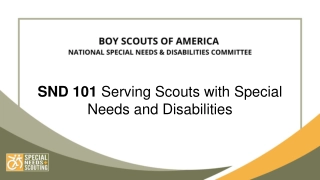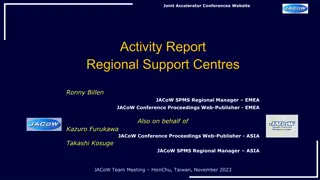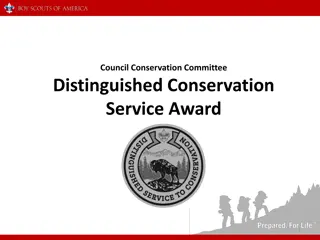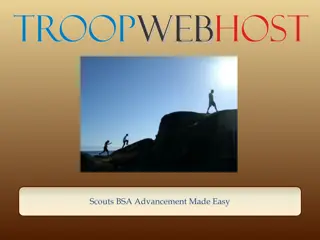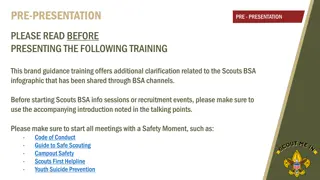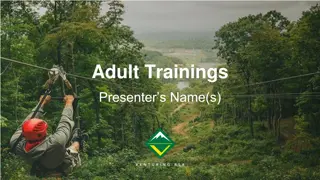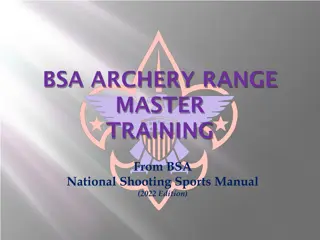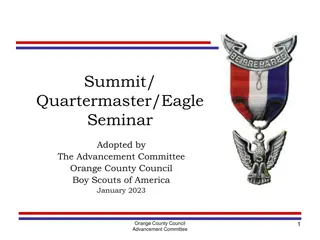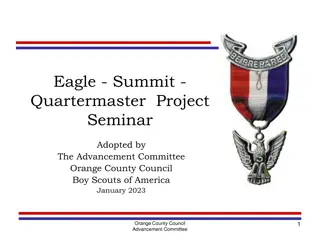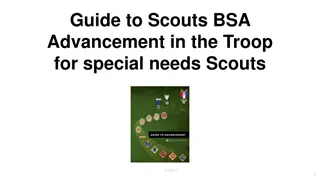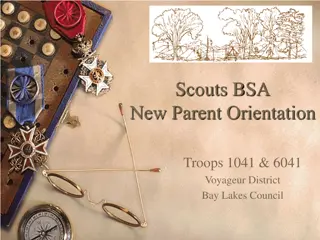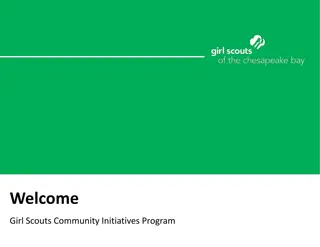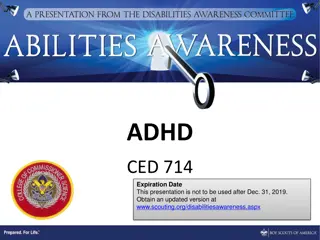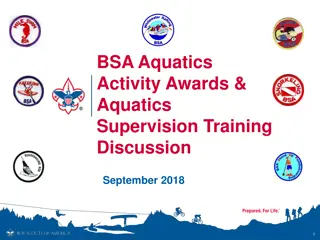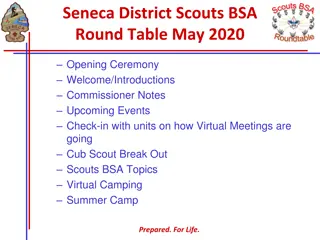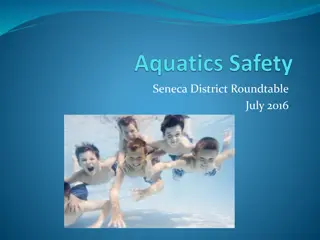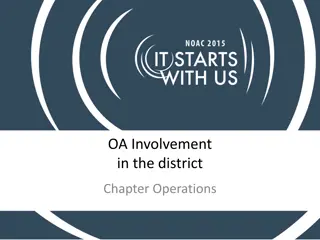Understanding the Role of Scoutmaster Conferences in Scouts BSA
Scoutmaster Conferences (SMCs) play a crucial role in guiding and counseling Scouts in a youth-led troop to help them grow, apply Scouting ideals, and advance in ranks. These conferences focus on assessing a Scout's growth, leadership potential, and overall well-being within the troop. The relationship between a Scout and their Scoutmaster is essential for the troop's success and the Scout's personal development. Through SMCs, the Scoutmaster evaluates a Scout's understanding of Scouting's values, their application in daily life, and readiness for the next rank.
Download Presentation

Please find below an Image/Link to download the presentation.
The content on the website is provided AS IS for your information and personal use only. It may not be sold, licensed, or shared on other websites without obtaining consent from the author. Download presentation by click this link. If you encounter any issues during the download, it is possible that the publisher has removed the file from their server.
E N D
Presentation Transcript
Massabesic District Scouts BSA Roundtable September 14, 2020 Scoutmaster Conferences (SMC)
Scoutmaster Conferences In a youth-lead troop, the Scoutmaster does not assert his authority, but guides and counsels every Scout so that the troop can function well and serve the purposes of Scouts BSA program. The Scoutmaster conference (SMC) is one of the primary ways the Scoutmaster does this.
Scoutmaster Conferences At the completion of the skills and knowledge requirements for each Scout rank, an important event takes place: the Scoutmaster Conference. While an advancement SMC is typically held at the completion of the rank requirements, a SMC can take place at anytime. Another issue to be considered at the SMC is the concept of Scout spirit, which is part of the advancement process.
Why a Scoutmaster Conference? The relationship between a Scout and his Scoutmaster is important for the troop s health and for the Scout s success. The Scoutmaster must watch the troop s dynamics to see who is showing leadership, who is holding back, who is shy, who is working with the younger Scouts, who is skilled in outdoor activities, etc.
The Role of the Scoutmaster Conference According to the Boy Scouts of America charter, the purpose of Scouts BSA is to develop in a young people the ability to do things for themselves and for others, to train them in outdoor skills, and to teach them patriotism, courage, self-reliance, and kindred virtues. We use the methods of Scouting including advancement, the outdoors, and adult association to accomplish these goals.
The Role of the Scoutmaster Conference (cont.) In that context, the SMC allows the Scoutmaster to review: The Scout s growth in their understanding of Scouting s ideals How the Scout applies these ideals in their daily life and in the troop The requirements of the Scout s next rank so that they can be properly encouraged
The Role of the Scoutmaster Conference (cont,) Further, the Scoutmaster must watch the individual Scout to determine whether they are advancing, whether they are having fun, and whether they seem eager or uneasy.
Who Conducts the Scoutmaster Conference? Performing these activities to gain insight of the Scouts is not easily performed if a Scoutmaster delegates SMC to assistants. But sometimes this is necessary. So close cooperation and communications between the Scoutmaster and his assistants is essential.
Who Conducts the Scoutmaster Conference? (cont.) In large troops, delegating this function may be necessary, especially when large numbers of Webelos Scouts are joining the troop. In these cases, an experienced assistant Scoutmaster can fill in to conduct the SMC.
Who Conducts the Scoutmaster Conference? (cont.) Remember however, that a Scout s first SMC is vital to the new Scout s development and their expectations of what to look forward to in future SMCs. Even in a large troop, a Scoutmaster should avoid delegating a SMC with any candidate for Star, Life, and Eagle.
When and Where to Hold a Scoutmaster Conference The SMC should be held in a quiet place that is conducive to give and take between the Scout and Scoutmaster. The Scoutmaster can ask the Scout where they would like to meet or suggest a location.
When and Where to Hold a Scoutmaster Conference (cont.) The Scoutmaster should avoid the possibility for embarrassing the Scout, but remember that the BSA Youth Protection policy requires that one-on-one sessions between a youth and an adult be visible and accessible by other people.
When and Where to Hold a Scoutmaster Conference (cont.) Some possible meeting places include: a quiet corner of the Scout meeting hall during a troop meeting, or, in a larger troop, a hallway outside the troop meeting area, A good time for a SMC is on a campout, a hike, or at summer camp are as long as the Scout and Scoutmaster remain visible to the other Scouts and leaders.
When and Where to Hold a Scoutmaster Conference (cont.) An ideal place for a Scout s first SMC might be at their home, where they would be more comfortable and better able to express their thoughts, hopes and desires. This would also give the Scout s parents insight on what happens at a SMC and an opportunity for the Scoutmaster to engage them in their child s Scouting activity.
When and Where to Hold a Scoutmaster Conference (cont.) Because the conference is designed to provide direct give and take between Scout and Scoutmaster, for both the Scout s good and the good of the troop, a SMC can take place any time, especially when a Scoutmaster senses that a Scout needs a conference or if the Scout asks for one. Of course, each rank advancement requires that the Scout have a formal SMC.
Types of Scoutmaster Conferences A SMC is simply a chance to talk to a Scout about how they are doing, how they feel about the troop and their role in it, how they are advancing, and how they are striving to live up to Scouting s ideals. Consequently, a SMC can take place anytime and for any reason.
Types of Scoutmaster Conferences (Cont.) Some reasons to have a SMC may include: A Scout s lack of advancement A perceived trouble between the Scout and others in the troop A certain event at the last campout or troop meeting
Types of Scoutmaster Conferences (Cont.) Scouts should be informed that they can ask for a SMC conference at any time. They should know that a meeting with the Scoutmaster does not need to be limited to rank advancement but can involve other any subject the Scout feels comfortable discussing with the Scoutmaster.
How to Hold a Scoutmaster Conference The SMC on advancement is neither an interrogation nor a retesting of a Scout s competence. It should be an informal conversation between Scout and Scoutmaster either toward a certain goal or as a requirement for advancement.
How to Hold a Scoutmaster Conference (cont.) In either case, open-ended questions by the Scoutmaster are a good method to prompt the Scout s comments. Encourage them to come to conclusions on their own; don t simply tell them what you think. Also, encourage Scouts to ask questions during this meeting. Even, as a Scoutmaster, if you don t have an immediate answer, actively listen and make sure you understand what the Scout is asking.
How to Hold a Scoutmaster Conference (cont.) The non-advancement conference may be related to a problem, either with the Scout or with the troop. In these cases, you will be counseling the Scout, helping him form their own conclusions about the problem at hand. In a good conference you may listen more than you speak. Listen carefully to what the Scout is saying, then listen to what he is not saying.
How to Hold a Scoutmaster Conference (cont.) Skilled counselors often respond to comments by others by simply smiling or giving encouraging sounds like uh-huh or OK. Ask the Scout to repeat what they are saying a different way to get an entirely different take on the situation. Confirm your understanding of what the Scout is saying by summarizing, but try not to put the Scout in a corner.
How to Hold a Scoutmaster Conference (cont.) If there is a solution to the problem, try to allow the Scout to come up with it. Perhaps they cannot formulate a solution, but could choose from among several you can think of. In all events, try to have the Scout make the conclusions. If a solution cannot be found, agree to meet in the future to see if circumstances have changed or whether the Scout has found an answer to their problem.
How to Hold a Scoutmaster Conference (cont.) In the advancement conference, you will assess the Scout s readiness for their board of review (BOR) and their progress since their last Scoutmaster conference. This should not be a time of retesting his competence in Scouting skills; someone has already attested to that. The Scout must have completed all of their requirements for rank before the advancement conference can take place.
How to Hold a Scoutmaster Conference (cont.) It is appropriate to review the Scout s achievements and to discuss them without retesting. Of course, this may be the time for you to check their advancement record for the appropriate signatures.
How to Hold a Scoutmaster Conference (cont.) You can and should ask a Scout how they felt about certain accomplishments and how they felt they handled themselves on a service project. Ask a Scout about their leadership position and whether they believe they were successful. You can discuss any problems with an eye toward solving them.
How to Hold a Scoutmaster Conference (cont.) A Scout who is not ready to face a BOR (the last step in the advancement process) can be counseled if you sense a lack of Scout spirit or leadership. The Scoutmaster conference should not be a time to shut the door on advancement but to work with the Scout to create goals that will allow him to succeed.
How to Hold a Scoutmaster Conference (cont.) The requirement for advancement is that the Scout participate in a SMC, not that he pass the conference. Even after a negative SMC, if the Scout desires a BOR, they should be allowed to ask for and have one conducted.
How to Hold a Scoutmaster Conference (cont.) When advancement may be deferred, it is important that there be no surprises. The Scout should not come to the SMC or BOR thinking that everything is OK and then be surprised that their advancement is deferred. They should have had plenty of warning and guidance prior to the negative SMC or BOR.
How to Hold a Scoutmaster Conference (cont.) Always end a Scoutmaster conference with praise for the positive aspects of the Scout s character, their skill level, and/or their accomplishments.
Questions to Ask During an Scoutmaster Conference Scout Spirit Duty to Others Rank Advancement Likes & Dislikes Camping Trip Experiences Patrol Experiences Troop Experiences Leadership Goals Next Rank Goals Youth Protection
Scoutmaster Conferences Questions or Comments?


